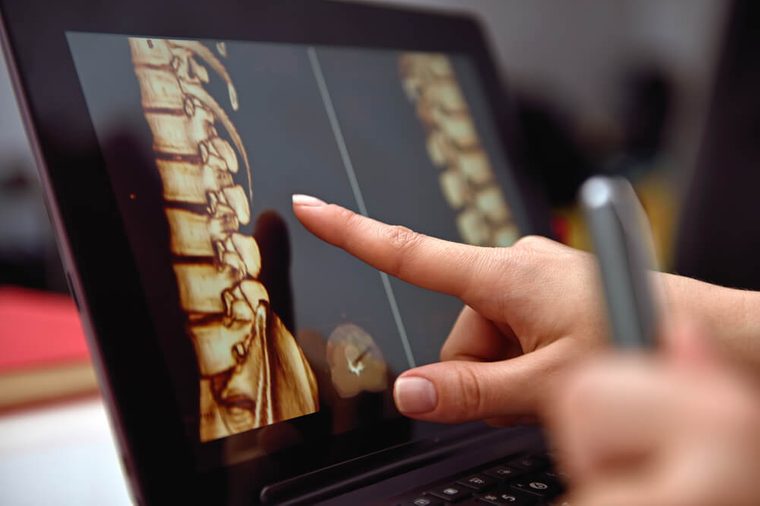Women are more at risk for these diseases
Of course, it makes sense that people with female reproductive organs are at risk for cervical cancer, polycystic ovarian syndrome, and PMS. (Although breast cancer in men is possible.) But once you’ve gotten past diseases of the reproductive system, wouldn’t the sexes have equal rates of other diseases? It isn’t so: even though both women and men have hearts and lungs, they do not get heart and lung diseases at the same rate. And that’s just the beginning.
Anatomical gender, and societal influences that are related to gender, create differences in hormones, physique, brain physiology, and more. Those differences can impact an individual’s risk of developing various diseases.
These are many of the conditions that strike women more than men, according to research and physicians who spoke with The Healthy.

Crohn’s Disease
Women are more likely to have Crohn’s disease, irritable bowel syndrome, and other serious gastrointestinal disorders than men are, according to a 2015 study published in the American Journal of Physiology. One reason may be that women are more likely to report and seek out help for stomach pain, while men are more inclined to “tough it out.”
But researchers also found gender-related features in the female brain that may make a difference. They discovered that the nerve cells that control the movement of food through the intestines are more sluggish in response to brain signals in women than in men. Slower food movement translates to a higher risk of infections, physical dysfunction, and chronic pain.

Gum disease
Bleeding, painful, and receding gums may seem like more of an inconvenience than a serious illness, but the bacteria that cause periodontal disease raise your risk of a heart attack. They can also cause a resistant infection that can travel to your brain and complications during pregnancy.
The American Academy of Periodentology suggests hormones, primarily estrogen, make women more susceptible to getting gum disease—especially during times of hormonal fluctuation, like pregnancy and menopause.
One way to keep your teeth healthy? Dental Health Experts Think You Should Finally Dismiss These 13 Sweet Tooth Beliefs.

Insomnia
Quality sleep can be hard to come by for both genders. However, the U.S. Department of Health and Human Services suggests women are twice as likely as men to experience insomnia.
This means some effects of insomnia can also be more severe for women—including more serious symptoms of depression, excessive daytime sleepiness, and more difficulty with memory and concentration. Chalk up the difference to hormones, again. Insomnia is correlated with times of hormonal fluctuations, including being a common symptom of PMS. Here’s how to deal with menstrual insomnia.
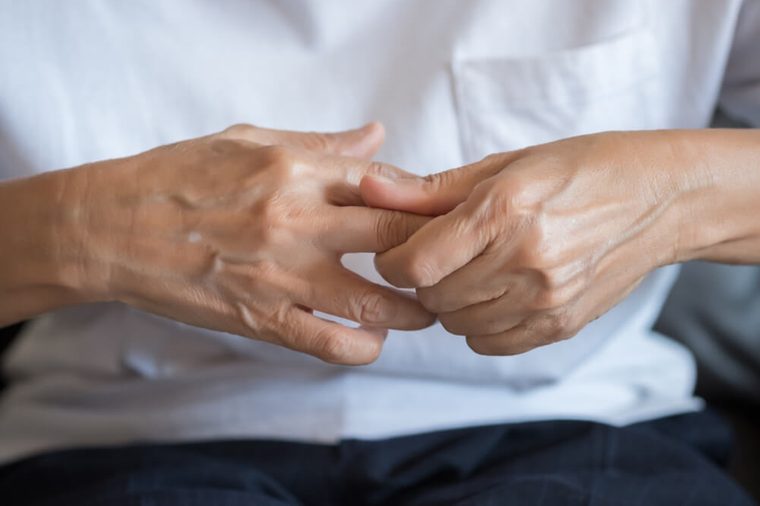
Osteoarthritis
“Women tend to have more flexible joints and elastic tendons than men,” says Gina Tran, MD, a family physician in California. This laxity is useful during pregnancy and birth, but also puts women at risk of sprains and injuries—leading to a three-fold greater risk of future osteoarthritis (OA). “Women also tend to have wider hips, which may affect the alignment of the knees and causes stress on them,” Tran says.
In addition, the U.S. Centers for Disease Control and Prevention (CDC) notes that women over the age of 50 are at increased risk of OA due to a loss of estrogen.
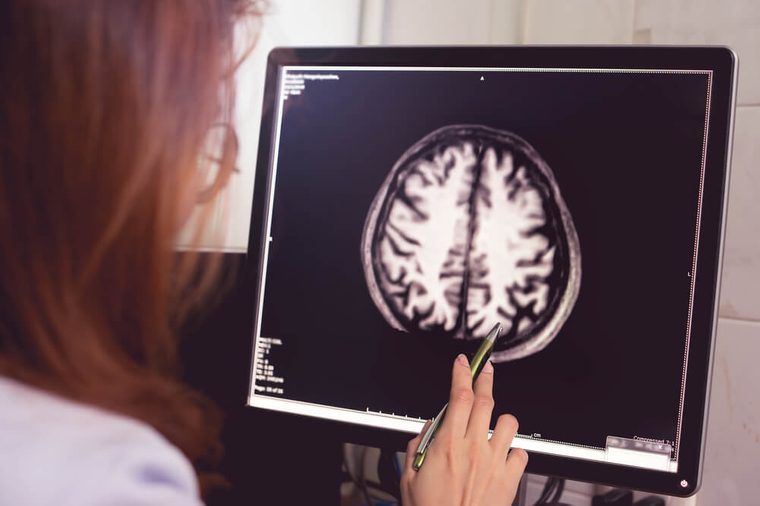
Alzheimer’s disease
The national Office of Disease Prevention and Health Promotion notes that women make up almost two-thirds of Americans with Alzheimer’s disease, the loss of cognitive function. For years, experts assumed the explanation for the gender difference was the fact that Alzheimer’s risk goes up as we age—and women live longer than men.
However, research suggests other factors may play a role, such as hormonal changes during menopause, according to research in JAMA Neurology and the Cure Alzheimer’s Fund.

Depression
According to a National Center for Health Statistics survey that was published in 2018, women were nearly twice as likely to have suffered from depression as men (10.4 vs. 5.5 percent). Because of hormonal shifts, women have a more changeable neurochemistry, which in turn increases the risk of depression, says psychologist Deborah Serani, PsyD.
Serani suggests that the way some women internalize stress can lead to lowered brain functioning in areas responsible for mood.
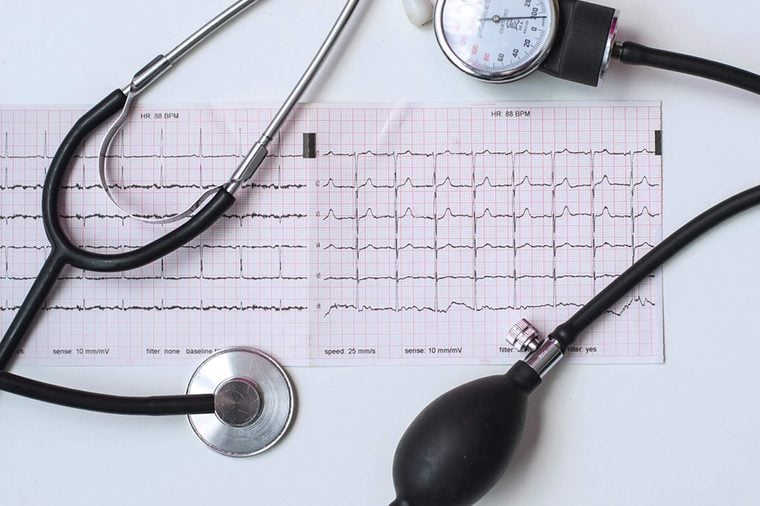
Heart disease
Heart disease is the number one killer of both men and women in the U.S.—but women are more likely to die after a heart attack than men.
Why? Women have smaller blood vessels than men, making females more likely to experience blockages, says Jean McSweeney, PhD, RN, professor and associate dean for research at the University of Arkansas Medical Sciences College and author of an American Heart Association research paper on heart attack symptoms in women. McSweeney adds that women often have atypical symptoms of chest pain—which can lead to delays in diagnosis and treatment, potentially leading to a less optimal outcome.
Read more in 6 Ways Heart Disease Is Different for Women, Cardiology Experts Say.

Anxiety
There’s been plenty to worry about these days, and some women may take it harder than men do. As the U.S. Department of Health and Human Services suggests, women are more than twice as likely to suffer from anxiety as men.
Dr. Serani says that there are biological reasons for the gender difference in anxiety rates. Women have lower levels of corticotropin-releasing factor (CRF), a hormone that helps you deal with stress, Dr. Serani says.
Looking for a healthy way to process your worries? A Psychologist Says This Trending Way to Handle Emotion May Actually Be Good for Your Heart.
Post-traumatic stress disorder (PTSD)
Nightmares, insomnia, depression, and anxiety are some of the most common signs you could have PTSD. Serani suggests both genders can suffer from this mental illness, but women are more than twice as likely to show symptoms because post-traumatic stress disorder is the result of trauma—and women are exposed to more emotional, sexual, and physical abuse than male counterparts. “[Women] also tend to be victims of trauma at earlier ages than boys,” she adds.

Urological problems
Leslie Gonzalez, MD, OB/GYN, says anatomy is a major reason women get more urinary tract infections (UTIs) than men. “A woman’s urethra is in close proximity to the vagina and rectum, where many bacteria live,” which, she says, “puts them at higher risk for urinary tract infections.”
She adds that childbirth can increase the incidence of incontinence for women who have delivered children. That’s because pregnancy puts a strain on the pelvic floor muscles, which are crucial to the support of the bladder and bladder neck.
Drinking plenty of water can help avoid UTIs, and pelvic floor exercises can help prevent incontinence. Read about more bladder health issues that can creep up in each decade of life.
There’s a simple piece of home gym equipment that can help you work on strengthening your pelvic floor. Read The Best Gear for Working Out in Small Spaces—From a Personal Trainer.

Lupus
A remarkable 90 percent of people with lupus, an autoimmune disease, are women, according to the U.S. Department of Health and Human Services (HHS). The vast majority of these tend to be women of childbearing age (15 to 44).
“Autoimmune” means the body attacks its own tissue. With lupus, this can affect everything from the skin to internal organs. Because lupus often strikes younger women, it’s thought that higher estrogen levels, combined with environmental factors, may play a role. Genetic research, such as a 2018 article in Science Immunology, has also suggested that the presence of two X chromosomes in women may increase the risk of the disease.

Eating disorders
The American Psychological Association (APA) says research on what causes anorexia, bulimia, and other eating disorders is ongoing. The HHS notes that eating disorders may develop from a combination of biology and social experiences that tend to affect females at higher rates than males. “Girls are socialized about thinness and beauty from the time they’re very young,” Serani says, adding: “Because society places unattainable, perfectionistic goals regarding beauty [on] women, they are prone to more eating disorders and body image issues than men.”

Sexually transmitted infections
Although sexually transmitted infections (STIs) can affect anyone of any gender, they have disproportionately serious effects on women, says the CDC—and they’re on the rise. “Differences in human anatomy make it more challenging to recognize the symptoms of infection in women, and so many infections are undiagnosed,” says Harvey Kaufman, MD, senior medical director at Quest Diagnostics, a company that tests for STDs. “As a result, women are much more likely to suffer long-term health impacts, such as pelvic inflammatory disease and infertility from diseases such as chlamydia and gonorrhea.” Herpes and syphilis can also be dangerous to women and their babies during pregnancy, and human papillomavirus (HPV) can cause cervical cancer. This is why it’s so important to insist on safe sex practices with your partners, he says.
Women and men can get HPV—read Doctors Say Knowing About This Vaccine Could Cut Your Cancer Risk Significantly.

Chronic fatigue syndrome
Also known as myalgic encephalomyelitis (ME or ME/CFS), chronic fatigue syndrome has similar symptoms to an autoimmune disease, but isn’t currently considered to be one.
Marked by extreme exhaustion, women are two to four times more likely to get it than men, according to the HHS. Its causes are little understood, diagnosis can be difficult, and there are no FDA-approved treatments. Some research, though, is illuminating the reasons some women develop it: a 2017 study published in the journal PNAS (from Proceedings of the National Academy of Sciences) found that certain proteins, or cytokines, in the blood could increase inflammation and fuel the disease.
Here are eight chronic fatigue syndrome symptoms, and other possible medical reasons you’re tired all the time.
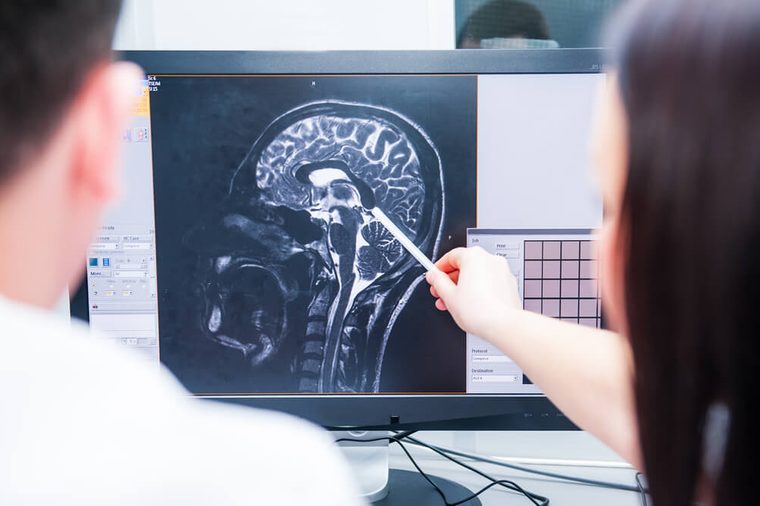
Stroke
About 55,000 more women have strokes than men per year, and more women die from them, according to the American Heart Association. Pregnancy, preeclampsia, taking birth control pills, hormone replacement therapy, migraines with an aura, depression, and atrial fibrillation—all things more common in women—drive up female stroke risk, the AHA says. “Higher hormone levels are known to have a pro-coagulant effect, so the blood can clot more readily with higher levels or rapidly changing levels of hormones,” says Diana Greene-Chandos, MD, assistant professor of Neurosurgery and Neurology at The Ohio State University Wexner Medical Center. ” Be sure you know stroke symptoms in women.

Thyroid disease
Hypothyroidism, in which your thyroid doesn’t produce enough hormone to regulate your metabolism, is the most common thyroid issue. Women are eight times more likely to have a thyroid problem than men, while one in eight women will develop it during her lifetime, according to the American Thyroid Association.
Researchers say the reasons for the large discrepancy aren’t entirely clear, but one explanation is that most thyroid disorders are caused by autoimmune responses—which, again, are more common in women. Read more about how thyroid problems could be affecting your general wellness.
Multiple sclerosis
Yet another autoimmune disease that attacks women more than men is multiple sclerosis (MS). In fact, it’s three times more common in women than in men, states the National Multiple Sclerosis Society.
With MS, your body attacks the nerves in the brain and spinal cord, resulting in pain, numbness, and weakness. Although there’s no definitive answer yet as to why more women have the disease, researchers are looking into possible connections to hormonal factors and sex differences in the brain, as well as body fat. One recent U.S. study also found evidence suggesting the Epstein-Barr virus can lead to M.S.
Celiac disease
Otherwise known as gluten intolerance, celiac is an autoimmune condition in which the body attacks the lining of the small intestine. More than half of sufferers are women, according to the HHS.
Symptoms of Celiac disease can include severe diarrhea, bloating, gas, and heartburn. If untreated, celiac disease can cause malnutrition, chronic pain, osteoporosis, and other serious conditions. Symptoms may sometimes be confused with irritable bowel syndrome (IBS), which is also more common in women. Women have more reactive immune systems and may have some genetic variations that make them more likely to get celiac disease. Interestingly, thyroid disease is associated with other autoimmune diseases, including celiac, says the American Thyroid Association.
Sign up for The Healthy @Reader’s Digest newsletter for nutrition know-how and plenty more. Follow us on Facebook and Instagram. Keep reading:



